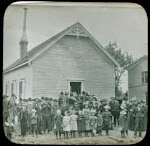Accordingly,
evangelization of the majority of mankind was reserved for the Millennial Age. In
what he called “the gospel age,” the age in which they lived, the heaven-bound
Bride of Christ was the target of their evangelism. They would be transformed,
counted as justified, perfect humans, and then counted as the sprit creatures
they would become in fact on their translation or resurrection to heaven:
During this age, as many as now hear (“He that
hath an ear let him hear,”) the good news are by it informed that Christ
died for our sins, that the price of sin has been paid, and they are justified,
if they believe it, and that they can come unto God not as sinners but
as righteous persons, and by faith call God “Father.” It is as justified
(perfect) fleshly beings that they now call God Father – because
in God’s sight restored to the condition occupied by Adam before he became a
sinner ... . The next step for these justified beings to take, is to consecrate
their justified flesh (being) to God. “Present your bodies a living
sacrifice,” present it to God alive, for his service.[1]
That
salvation for the majority of mankind would await salvation until after Christ’s
return was not original to Russell. None of his theology was. His belief that
the world of mankind came to salvation after Christ’s second advent was an
extension of Reform [in this case Congregationalist] theology as represented by
Jonathan Edwards [1703-1758] and other American colonial era participants in
the first Great Awakening. Edwards’ view of the matter was:
It is very dangerous for God's professing people to
lie still, and not to come to the help of the Lord, whenever he remarkably
pours out his Spirit, to carry on the work of redemption in the application of
it; but above all, when he comes forth, to introduce that happy day of God's power
and salvation, so often spoken of.' That is especially the appointed season of
the application of redemption. The appointed time of Christ's reign. The reign
of Satan as god of this world lasts till then; but afterwards will be the
proper time of actual redemption, or new creation, as is evident bv Isa. Ixv.
17, 18, &c. and Ixvi. 12. and Heb. xxi. 1. All the outpourings of the
Spirit of God before this, are as it were by way of anticipation. There was
indeed a glorious season of the application of redemption in the first ages of
the Christian church, which began at Jerusalem, on the day of Pentacost;
but that was not the proper time of ingathering. It was only as it were the
feast of first-fruits; the ingathering is at the end of the year, or in the
last ages of the Christian church, as is represented, Rev. xiv. 14-16. and will
probably as much exceed what was in the first ages of the Christian church,
though that filled the Roman empire, as that exceeded all that had been
before, under the Old Testament, confined only to the land of Judea.[2]
Edwards
thoughts echoed through American Congregationalism into Russell’s day. It is
hard to imagine that Russell did not hear preaching that restated Edwards. He
accepted it a soundly Biblical.
With
some considerable quibbling and qualification, traditional churches found
Russell’s explanation of justification questionable. For William Coit Stevens,
objections derived from the non-Trinitarianism behind Watch Tower theology, and
Watch Tower teaching that the Bride has a role in the sacrifice of Christ.[3]
Current Watchtower teaching strongly resembles Russell’s exposition here,
though it rejects any thought of the heavenly Bride of Christ as part of the
ransom sacrifice. The key point, however, is that Watch Tower adherents were to
present their bodies as a living sacrifice to God, doing his will and seeking
others of God’s choosing.
[1] C. T. Russell: In the Flesh, Zion’s Watch Tower¸
April 1881, pages 3-4.
[2] The Works of Jonathan Edwards, William Ball,
London, 1839, Volume 1, page 383.
[3] W. C. Stevens: Why I Reject the “Helping Hand” of
Millennial Dawn, M. G. McClinton & Co., San Francisco, California,
1915, pages 111-112.



3 comments:
Yes, this all makes sense to me. No religious teacher in the US could have been unaware of Edwards.
I wondered if the statement "That salvation for the majority of mankind would await salvation until after Christ’s return was not original to Russell" might read better as "That salvation for the majority of mankind would await Christ’s return was not original to Russell"? Does this still read as you wanted or have I misrepresented it somehow?
Gary
This brief article is sensational!
Really interesting, thank you.
I have the feeling that Rutherford's (or Rutherford era's) new teachings are more original than Russell's teachings -which is neither good nor bad. What do you think?
Post a Comment